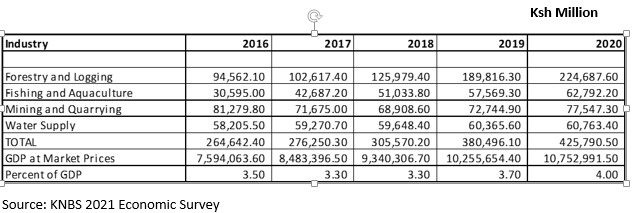Many a time children are made to answer the question; what would you like to be when you grow up? Filled with eagerness to take on the world, most of the answers are a somewhat lingering chime of engineering, aviation or medicine, and etcetera. Hardly will ‘a fisherman, seafarer or docker’ pop up as a response. Granted, stories of people who have made a decent living in the marine sector are inaudible let alone evident. As the labor market shifted towards white collar jobs in the 21st century, many were blinded to the realization that career changing opportunities were available in other sectors. Governments, more so, in developing countries have been finding it difficult to fulfill their promise of increasing employment opportunities for the youth who proud themselves on being university graduates hence discrediting undertaking work in ‘informal sectors’ unless forced by economic circumstances.
Discussions surrounding exploiting opportunities in other sectors of the economy have been gaining momentum in recent years. Recently, global leaders have hosted events meant to establish appropriate frameworks to tap into areas such as green production and financing and the blue economy. On 26TH November 2018, Kenya hosted the first ever Blue economy conference that brought together all global actors and stakeholders. The conference theme, the blue economy and the 2030 agenda for sustainable development, recognized the need for African countries to exploit their water resources to create meaningful and stable sources of livelihoods which ultimately boosts overall economic growth. Kenya’s reliance and investment on its abundant water resources has been underwhelming hence confining communities living and depending on water bodies such as lakes and oceans to abject poverty. Furthering that agenda, the Government, in collaboration with the Ministry of Environment and Forestry, continued to intensify environmental conservation measures aimed at safe guarding natural resources and improving livelihoods of those who depend on it, through 2020. Data from the Kenya National Bureau of Statistics 2021 Economic Survey indicate that the share of environment and natural resources Gross Value Added increased from KES 380.5billion in 2019 to KES 425.5billion in 2020. Therefore, as illustrated in the table below, the contribution of environment and natural resources to overall Gross Domestic Product increased by 0.3 percentage points from 3.7% to 4% .

Within the sector, fishing and aquaculture lagged behind other prominent subsectors, notably forestry and logging, water supply and mining and quarrying. A microscopic analysis of fishing and aquaculture performance between 2019 and 2020 highlight the dominance of fresh water fishing output over marine fishing. The quantity of fish landed from freshwater sources increased by 2.0 per cent in the period under review from 121,580 tonnes to 124,021.4 tonnes. However, fish landings from marine sources declined by 7.2 per cent between 2019 and 2020 from 27,638 tonnes to25,656.4 tonnes. This more than quadruple production resulted in freshwater fishing generating approximately KES 20 billion against KES 3 billion generated by marine fishing over the same period of time. The low flow of investment in Kenya’s marine subsector is further demonstrated by analyzing the net domestic sales of petroleum fuels between 2016 and 2020. The 2021 Economic Survey illustrates that the marine sector (exclusive of naval forces consumed approximately 1,100 tonnes of fuel compared with 6.6 million tonnes and 392,700 tonnes consumed by retail pump outlets and road transport and aviation (excluding Government) respectively in 2020.
For the blue economy to make its mark in Kenya’s overall economic growth, institutions and stakeholders within the sector need to invest substantially in visibility and sensitization. Currently, there are five major institutions that play a key role in promoting and strengthening the performance of the marine sector in Kenya. These institutions include: Kenya Marine and Fisheries Research Institute, Kenya Maritime Authority, Kenya Fisheries Services, Kenya Ship Agents Association and Kenya Shipyard Limited. The roles and mandates of these institutions are not clear and this has partly contributed to investors shying away from committing capital investment in this lucrative sector. The Government’s efforts to rehabilitate key infrastructure such as roads and railway networks will boost productivity however, failure to address maritime infrastructural needs will cripple growth acceleration and momentum.
Best practice
Stakeholders in the marine industry, more so the Government, need to scale up sensitization and visibility initiatives to the public, through exhibitions and educative projects that will trigger interest from investors and academia to conduct deeper and intensive research on the feasibility, profitability and risk of Kenya’s blue economy.
The private sector, particularly financial institutions, can also extend its support through availing special financing strategies to those seeking to invest in maritime activities. A further collaboration between the Government and non-governmental entities based around the coastline and water bodies can support the conceptualization of relevant policies that promote innovation, equality and proper utilization of available marine resources. Kenya can use its membership in various economic blocs to champion for deeper collaboration among member states. This initiative could lead to exchange of knowledge and technical know-how, tax incentives, joint discussions on regulation and establishment of well-equipped laboratories and research institutes which would enable the region experience uniform growth and leverage on economies of scale.
Conclusion
In retrospect, the COVID-19 pandemic brought a challenge to the development of the Blue economy, attributed by the redistribution of resources and shift in focus, to the health sector. Now that the country is recovering from the aftermath of the pandemic, resources and initiatives have to be re-directed back to the blue economy in order to avoid a relapse. Peter Thomson, the Special Envoy to the United Nations, once said that a country cannot have a healthy economy without a healthy marine and this should be our guiding principle in pursuit of a stronger, vibrant and sustainable blue economy.


